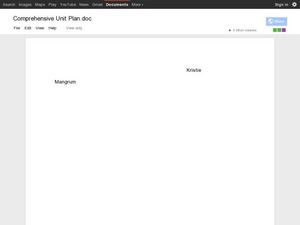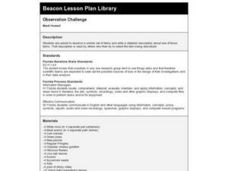Curated OER
Getting to Know You: Meal Worms
Students recognize differences between themselves and other people, and accept their uniqueness as a positive gift, by studying meal worms.
Curated OER
Take A Meal Worm To Lunch
Seventh graders, using a magnifying glass, observe mealworms in a cup.
Curated OER
Animal Activities: Teacher's Pets
Students watch meal worms turn into beetles in the classroom.
Curated OER
Mealworm Exploration
Second graders explore and discover different things about mealworms. In this mealworms lesson plan, 2nd graders look at, play with, and try to manipulate meal worms.
Curated OER
Mini-Ecosystems
Third graders identify the living and non living things in a book read aloud and discuss the interactions represented in the book. Then, they research and include a list of food that each animal needs in an ecosystem. Finally, 3rd...
Curated OER
How to Keep a Scientific Journal
Students record observations of a living organism over a period of time. They observe meal worms and record their observations in a scientific journal.
Curated OER
Observation Zooming
Sixth graders use zoom lenses to observe meal worms and draw them from three different zoom levels. They complete their artwork in sketchbook and complete a questionnaire about their abilities as scientific artists.
Curated OER
Hey, Look Me Over!
Students make observations about mealworms using hand lenses, rulers, and cotton swabs. Students complete their own mealworm observation chart, then they share their observations with the class. This is one station out of five in an...
Curated OER
Cows, Worms, and Compost
Students study decomposition. For this decomposition lesson, students discuss the background information about decomposition. Students then complete the 'Chew It Twice' worksheet.
Curated OER
Cycles and Starting Mealworms
Here is a fascinating lesson about the life cycles of plants and animals, and other cycles found in nature. Learners explore the cycle of the moon, the tides, and other sequences of events in every day life. The big activity is the...
Curated OER
Clay Ants: Insect Anatomy
Students examine anatomic structures in order to identify insects from other living organisms. They gain a level of comfort from anxiety when observing and handling live and pinned insects. They create clay models of an insect.
Curated OER
Investigation 3 - Terrariums / Aquariums
Third graders create aquariums or terrariums to explain how creatures depend on living and nonliving things.
Curated OER
The Life Cycle of the Mealworm
Fourth graders provide a habitat for live mealworms and observe their life cycle. In this animal life cycle and scientific inquiry lesson, 4th graders create a habitat for a live mealworm and observe and record related data as it grows....
Curated OER
Observation Challenge
Fourth graders, in groups, use observation skills at 12 stations and describe what they see.
Curated OER
Lesson Plan 3: Great Book, Gross Book
It's time for your scholars to become book reviewers! Start with a fun review of foods: are they good or gross? Learners apply these evaluation techniques to books, recording their thoughts on large pieces of butcher paper. Simply have...
Curated OER
Student Designed Investigations: Observations
Students choose an organism and create an experiment with that organism. In this observation lesson plan, students expose a living thing to something from its environment and record their observations. Students must have some prior...
Other popular searches
- Meal Worms Color Preference
- Meal Worms Activities
- Crickets and Meal Worms
- Meal Worms for Chameleons
- Meal Worms Metamorphosis
- Science Meal Worms
- Life Cycles Meal Worms
- Meal Worms Maze
- Insects Meal Worms
- Meal Worms and Chameleons
- Racing Meal Worms
- Meal Worms Metamorphasis


















